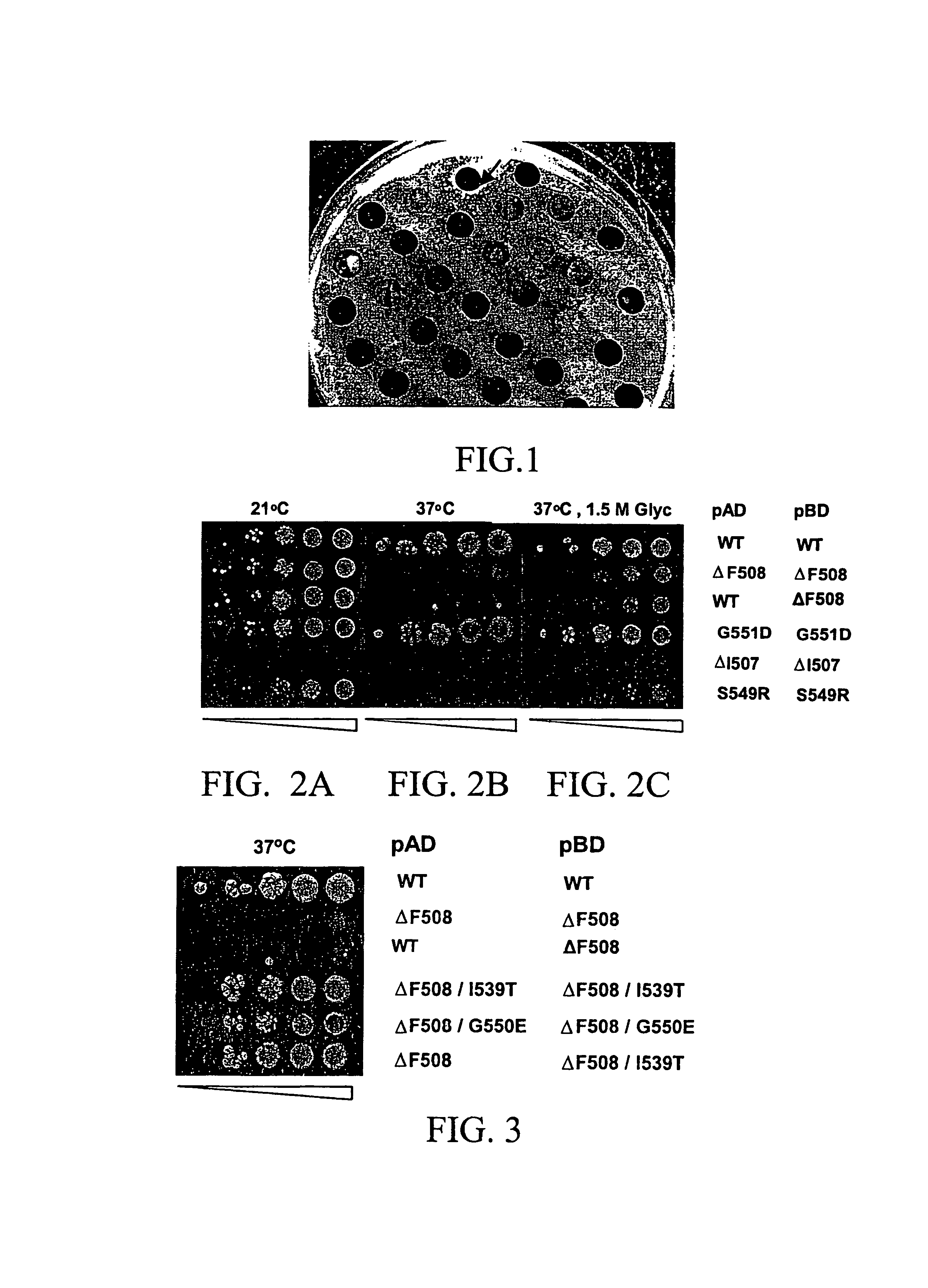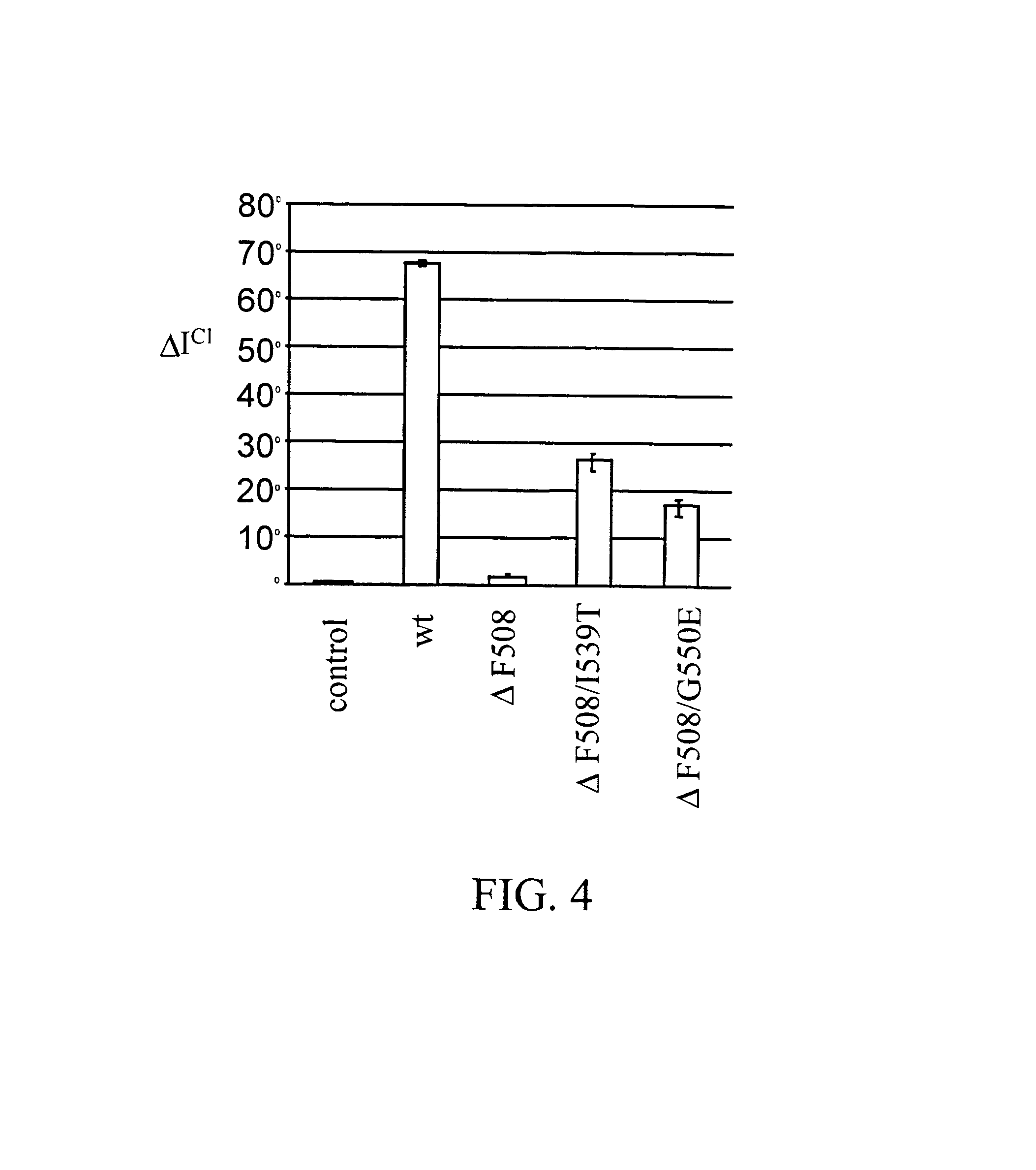Materials and methods for detecting interaction of CFTR polypeptides
a polypeptide and polypeptide technology, applied in the field of materials and methods for detecting interaction of cftr polypeptides, can solve the problems of reducing the number of patients with cft, destroying lung tissue, and unable to be readily reversed or controlled by conventional treatment, so as to facilitate proper dimerization of cftr polypeptides, efficient identification and screening, and restore the dimerization of a protein
- Summary
- Abstract
- Description
- Claims
- Application Information
AI Technical Summary
Benefits of technology
Problems solved by technology
Method used
Image
Examples
example 1
Interaction of CFTR Proteins
[0047]A protein:protein interaction between the CFTR NBD1 polypeptide segment in each GAL4 fusion protein encoded by pBDPN-WT and pADPN-WT plasmids in YRG2-WT is expected to activate transcription of the HIS3 reporter gene in yeast, resulting in a HIS+ phenotype. Accordingly, the YRG2-WT strain was streaked onto agar plates containing synthetic complete media lacking tryptophan, leucine, and histidine (SC-HIS, -LEU, -TRP) to determine the HIS phenotype. As shown in Table 1, the YRG2-WT strain was phenotypically HIS− at all temperatures tested (21° C., 30° C., and 34° C.), indicating that the two NBD1 fusion proteins associated in vivo to activate GAL4 transcription. The YRG2 strain containing either the pBDPN-WT plasmid or the pADPN-WT plasmid alone was unable to grow on media lacking histidine. The wildtype CFTR NBD1 segment is thus able to self-associate and form dimers at 21° C., 30° C. and 34° C. When grown in liquid culture media (SC-HIS, -LEU, -TRP)...
example 2
Screening of Plants for Compounds Using the Yeast Two-Hybrid Assay
[0052]The YRG-F yeast strain used for this assay expresses two hybrid genes consisting of the N-terminal nucleotide binding domain of CFTR which contains the cystic fibrosis causing mutation ΔF508 (NBD1 ΔF508), fused to the DNA binding domain of the GAL4 transcription activator (GAL4BD) in the first hybrid and to the GAL4 activation domain (GAL4AD) of the second hybrid.
[0053]The yeast strain is used as a bioassay tool for the detection of dimerization of the NBD1 ΔF508 domain of CFTR. In the mutant human CFTR chloride channel containing the ΔF508 mutation, defective dimerization of the channel is impaired in a temperature-sensitive manner. Similarly, the dimerization of NBD1 ΔF508 in the YRG2-ΔF strain (the binding of the GAL4BD-NBD1 ΔF508 fusion protein to the GAL4AD-NBD1 ΔF508 fusion protein) is temperature-sensitive. In the absence of NBD1 ΔF508 dimerization, the YRG2-ΔF strain cannot activate transcription of the ...
example 3
Analysis of NBD1 Protein:Protein Interactions by the Yeast Two-Hybrid System
[0056]Because the ΔF508 mutation occurs in the NBD1 domain of CFTR, the dimerization of CFTR proteins may involve NBD1 and, thus, the ΔF508 mutation may result in defective NBD1 dimerization. To test whether NBD1 is able to dimerize in vivo, the two-hybrid system of yeast was utilized. The yeast two-hybrid system is an effective tool for demonstrating the binding interaction of two protein domains. The system is based on the well-characterized interaction of the DNA-binding domain (BD) and transcription-activation domain (AD) of the GAL4 transcription factor of yeast. The association of these two domains within the GAL4 protein results in the specific initiation of transcription of a reporter gene in yeast, but when these domains are expressed in yeast as separate domains, neither is capable of transcriptional activation in the absence of specific interaction with the other. The two-hybrid system was used to...
PUM
| Property | Measurement | Unit |
|---|---|---|
| Temperature | aaaaa | aaaaa |
Abstract
Description
Claims
Application Information
 Login to View More
Login to View More - R&D
- Intellectual Property
- Life Sciences
- Materials
- Tech Scout
- Unparalleled Data Quality
- Higher Quality Content
- 60% Fewer Hallucinations
Browse by: Latest US Patents, China's latest patents, Technical Efficacy Thesaurus, Application Domain, Technology Topic, Popular Technical Reports.
© 2025 PatSnap. All rights reserved.Legal|Privacy policy|Modern Slavery Act Transparency Statement|Sitemap|About US| Contact US: help@patsnap.com


